英语第六单元
6年级上册英语书第6单元单词

6年级上册英语书第6单元单词第一部分:介绍1.1 本文将介绍六年级上册英语书第六单元的单词内容,包括单词的拼写、发音和用法,并帮助读者更好地掌握这些单词。
1.2 第六单元的单词内容主要围绕生活中的家庭、家务和日常活动展开,是孩子们日常生活中常见的内容,通过学习这些单词,能够帮助他们更好地表达和理解生活中的各种情景。
第二部分:单词列表及解释2.1 单词列表以下是第六单元的单词列表:1. family2. mother3. father4. sister5. brother6. grandmother7. grandfather8. aunt9. uncle10. cousin11. baby12. cook13. clean14. wash15. shop16. play2.2 单词解释- family:家庭- mother:母亲- father:父亲- sister:姐妹- brother:兄弟- grandmother:祖母- grandfather:祖父- aunt:阿姨- uncle:叔叔- cousin:表兄弟/表姐妹- baby:婴儿- cook:烹饪- clean:打扫- wash:洗涤- shop:购物- play:玩耍第三部分:单词用法及示例3.1 单词用法这些单词主要用于描述家庭成员、家务活动以及日常生活中的活动内容。
3.2 示例- My family has four people: my father, mother, brother, and me. - My grandmother likes to cook delicious food for us.- We need to clean the house every weekend.- I often play with my sister after school.第四部分:单词练习4.1 单词拼写请根据单词的英文意思完成单词的拼写:1. Mother (母亲)2. Brother (兄弟)3. Clean (打扫)4. Play (玩耍)5. Cousin (表兄弟/表姐妹)4.2 单词填空请根据句子的意思填写适当的单词:1. I help my mother ____________ (cook/clean) dinner every day.2. My ____________ (grandfather/grandmother) loves to tell me stories.3. Let's go to the park and ____________ (shop/play) some games. 第五部分:总结5.1 通过本文的介绍,相信读者们已经对六年级上册英语书第六单元的单词有了一定的了解,希望大家能够在课堂上和家庭中多加练习,更好地掌握这些单词的拼写、发音及用法,努力提高自己的英语水平。
六年级英语上册第六单元教案(全)
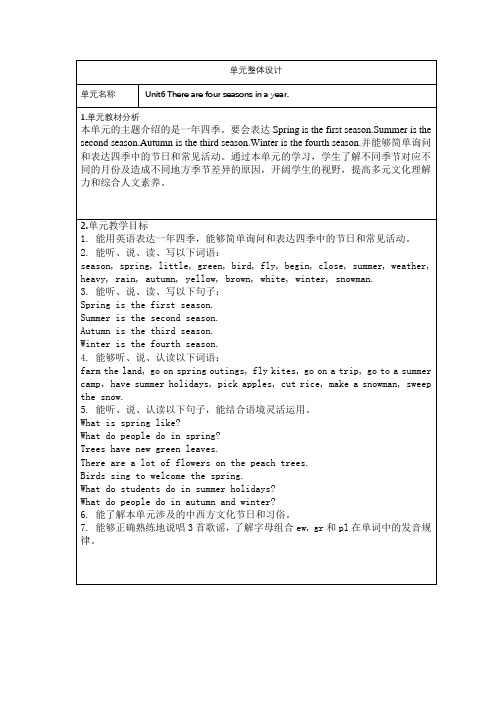
What is spring like?
6.教学反思与改进
成功之处:
不足之处:
改进措施:
课时教学设计
课题
Unit6There are four seasons in a year .Lesson32
授课时间:
课型:新授课
课时:第2课时
1.核心素养目标:
①语言能力:
1)能够完成本课中的目标句型的听、说、读、写训练和任务。
3)描述一年有几个季节的句型以及比较级的用法。
环节一:Warm up
1)播放歌曲Two Little Spring Birds,活跃课堂气氛。
2)值日生英语汇报,师生交流对话。话题内容除了日常交际之外,教师可有意识地引导话题走向,对上一课学过的春季特点、活动等进行复习。
3)让各组学生汇报上节课的联想内容,尽量使用英语,也可以用汉语。教师可以选择其中一些内容写在黑板上,或者把学生的作品直接贴在黑板上。
3)让各组学生汇报上节课的联想内容,尽量使用英语,也可以用汉语。教师可以选择其中一些内容写在黑板上,或者把学生的作品直接贴在黑板上。
4)游戏:结合上一课的练习,进行小型比赛。教师计时,看在规定时间内谁说的句子多(There are ... in a ...)。复习There are four seasons in a year.为要新授的核心语言做准备。
3) 课件呈现另外两个温度计,以不同颜色标注温度,数字按照高、更高、最高的顺序排列,分别指着温度计学习hot, hotter, hottest。
4) 提出问题,然后播放课文视频,整体感知课文内容,让学生从课文中去寻求以下问题的答案。
When does summer begin in China?
英语第六单元的课文

Main scene (教材页码P56-57)原文:Hey. Let's have some popcorn.翻译:我们一起吃爆米花吧。
原文:Yum! I'm so happy.翻译:美味!我好开心。
原文:I love popcorn!翻译:我喜欢爆米花!原文:Here you are. I'll go and get some drinks.翻译:给你。
我要去买些喝的。
原文:Wait for me.翻译:等我一下。
原文:Hey, where's my popcorn?翻译:嘿,我的爆米花呢?原文:Yum! It was so good.翻译:美味!很好。
原文:What?! How could you eat all the popcorn?! 翻译:什么?你怎么能吃完所有的爆米花?原文:We should share!翻译:我们应该分享!原文:Mum, if I feel angry, what should I do?翻译:妈妈,如果我觉得很气愤应该怎么办?原文:Well, first, take a deep breath.翻译:好,首先,深呼吸。
原文:Then you should count to ten.翻译:然后数到十。
原文:After that...?翻译:之后呢……?原文:After that, you won't feel so angry.翻译:之后,你不会觉得那么生气了。
原文:Mum, I feel ill.翻译:妈妈,我觉得我病了。
原文:Should I count to ten, too?翻译:我也应该数到十吗?原文:No, dear. You should see a doctor.翻译:不,亲爱的。
你应该看医生。
A Let's try (教材页码P58)一起试试原文:It's cold outside. Sam is talking with Sarah. 翻译:外面很冷。
人教版六年级上册英语第六单元
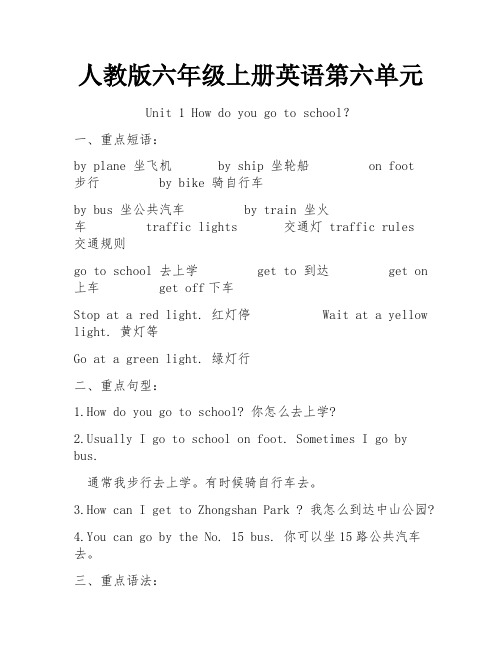
人教版六年级上册英语第六单元Unit 1 How do you go to school?一、重点短语:by plane 坐飞机 by ship 坐轮船 on foot步行 by bike 骑自行车by bus 坐公共汽车 by train 坐火车 traffic lights 交通灯 traffic rules交通规则go to school 去上学 get to 到达 get on 上车 get off下车Stop at a red light. 红灯停 Wait at a yellow light. 黄灯等Go at a green light. 绿灯行二、重点句型:1.How do you go to school? 你怎么去上学?ually I go to school on foot. Sometimes I go by bus.通常我步行去上学。
有时候骑自行车去。
3.How can I get to Zhongshan Park ? 我怎么到达中山公园?4.You can go by the No. 15 bus. 你可以坐15路公共汽车去。
三、重点语法:1、There are many ways to go somewhere.到一个地方去有许多方法。
这里的ways一定要用复数。
因为there are是There be句型的复数形式。
2、on foot 步行乘坐其他交通工具大都可以用介词by…,但是步行只能用介词on 。
4、go to school的前面绝对不能加the,这里是固定搭配。
5、USA 和 US 都是美国的意思。
另外America也是美国的意思。
6、go to the park 前面一定要加the. 如果要去的地方有具体的名字,就不能再加the ,如果要去的地方没有具体名字,都要在前面加the. ( go to school除外。
)7、How do you go to …?你怎样到达某个地方?如果要问的是第三人称单数,则要用:How does he/she…go to …?8、反义词:get on(上车)---get off(下车) near(近的)—far(远的) fast(快的)—slow(慢的)because(因为)—why(为什么) same(相同的)—different(不同的)9、近义词:see you---goodbye sure---certainly---of course10、频度副词:always 总是,一直 usually 通常 often经常 sometimes 有时候 never 从来不针对练习I.中英互译:boat_________ taxi_______ motorbike_______ bus _______地铁轮船飞机火车附近走路骑单车上学because_______ by car _______ sometimes________ often________II.用in,on,under,by,near填空。
英语第六单元作文

英语第六单元作文Unit 6: Our World。
Our world is full of diversity, beauty, and wonder. From the vast oceans to the towering mountains, from the bustling cities to the quiet countryside, there is so much to explore and discover.One of the most amazing things about our world is the incredible variety of plant and animal life. From thetiniest insects to the largest mammals, there are millions of different species that call our planet home. Each one is unique and fascinating, with its own special adaptations and behaviors.Another remarkable aspect of our world is the diversity of cultures and traditions that exist. From the ancient civilizations of Asia to the modern societies of Europe and North America, there are countless ways of life and ways of thinking that enrich our global community.Despite all of its wonders, our world also faces many challenges. Climate change, pollution, and resource depletion threaten the health and well-being of our planet and its inhabitants. It is up to all of us to work together to address these issues and create a more sustainable and equitable future.In conclusion, our world is a complex and beautiful place, full of both joys and challenges. By embracing its diversity and working to protect its health and vitality, we can ensure a bright and hopeful future for ourselves and generations to come.。
七年级下册人教版第六单元英语知识点

人教版英语七年级下册第六单元知识点如下:单词:1.看电视/电影 watch TV/ watch a movie2.看报纸 read a newspaper3.通过电话交谈 talk on the phone4.听音乐 listen to music5.使用电脑 use the computer6.做汤 make soup7.洗餐具 wash the dishes8.有点儿 kind of9.去电影院 go to the movies10.电视节目 TV show11.在六点钟 at six o’clock12.等待 sb/ sth Wait for sb/ sth13.那听起来不错 That sounds good14.电视新闻 TV news15.在周末 on the weekend16.购物中心 shopping center17.举起,抬起 lift up18.倒掉,倾倒 pour out19.报警 call the police20.报警电话 the police phone number21.消防电话 the fire phone number22.帮助,救援 help, rescue23.伤,受伤 hurt24.丢失,失落 lost25.迷路,迷失 lost way26.希望希望 hope to do sth/ hope that+句子27.想要,需要 want to do sth/ need sth28.谢谢你的帮助 Thank you for your help29.在乡下 in the countryside30.野餐 have a picnic31.湖,湖泊 lake32.在湖边 on the lake33.山,山峦 mountain34.在山顶 on the top of the mountain35.高楼大厦 tall building36.银行 bank37.超市 super market38.公园 park39.自然自然 nature40.电影院电影院 cinema41.剧院 theatre42.书店 book store43.学校 school44.医院 hospital45.大街,街道 street46.邮局 post office47.工厂 factory48.警察局 police station49.超市 super market50.银行 bank51.医院 hospital52.学校 school53.剧院 theatre54.公园 park55.图书馆 library56.购物中心 shopping center57.餐馆 restaurant。
人教版七年级上册英语知识点全第六单元unit6知识点
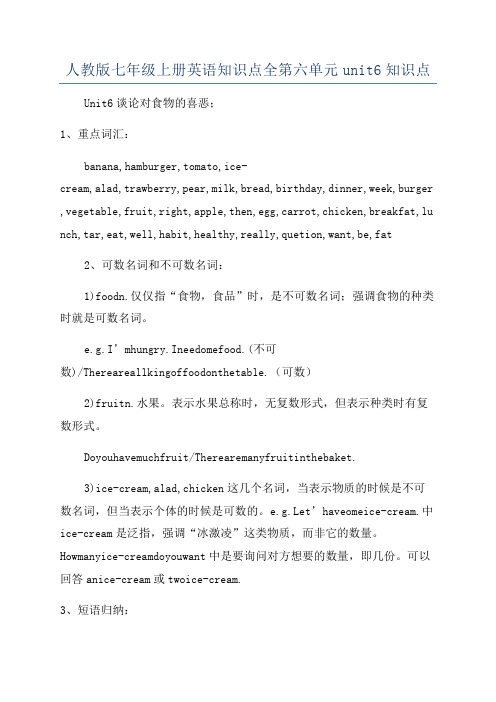
人教版七年级上册英语知识点全第六单元unit6知识点Unit6谈论对食物的喜恶;1、重点词汇:banana,hamburger,tomato,ice-cream,alad,trawberry,pear,milk,bread,birthday,dinner,week,burger ,vegetable,fruit,right,apple,then,egg,carrot,chicken,breakfat,lu nch,tar,eat,well,habit,healthy,really,quetion,want,be,fat2、可数名词和不可数名词:1)foodn.仅仅指“食物,食品”时,是不可数名词;强调食物的种类时就是可数名词。
e.g.I’mhungry.Ineedomefood.(不可数)/Thereareallkingoffoodonthetable.(可数)2)fruitn.水果。
表示水果总称时,无复数形式,但表示种类时有复数形式。
Doyouhavemuchfruit/Therearemanyfruitinthebaket.3)ice-cream,alad,chicken这几个名词,当表示物质的时候是不可数名词,但当表示个体的时候是可数的。
e.g.Let’haveomeice-cream.中ice-cream是泛指,强调“冰激凌”这类物质,而非它的数量。
Howmanyice-creamdoyouwant中是要询问对方想要的数量,即几份。
可以回答anice-cream或twoice-cream.3、短语归纳:John’birthdaydinner约翰的生日晚餐ne某tweek下周thinkabout思考,考虑howabout怎么样omefruit一些水果hibirthday他的生日porttar体育明星eatinghabit饮食习惯forbreakfat作为早餐fordinner作为晚餐onelatquetion最后一个问题healthyfood健康的食品3、tomato可数n.“西红柿”复数形式:tomatoe人教版七上2022知识点总结全类似的以o结尾的名词,需加–e构成复数形式的单词还有potato,hero但photo等词而是以加—构成复数形式的。
英语知识点:第六单元
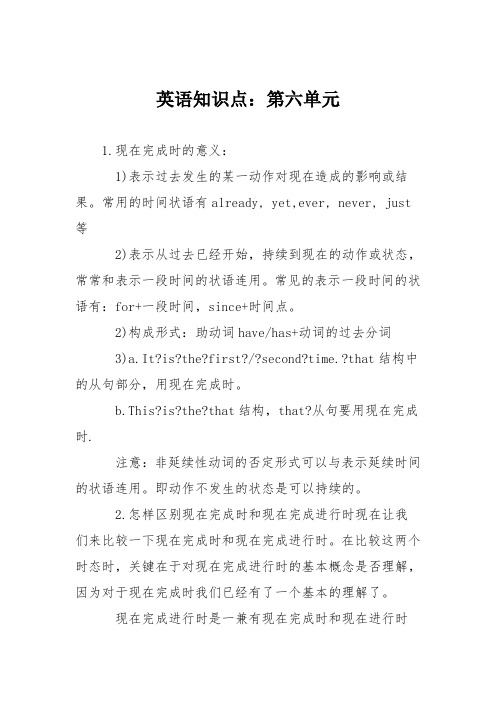
英语知识点:第六单元1.现在完成时的意义:1)表示过去发生的某一动作对现在造成的影响或结果。
常用的时间状语有already, yet,ever, never, just 等2)表示从过去已经开始,持续到现在的动作或状态,常常和表示一段时间的状语连用。
常见的表示一段时间的状语有:for+一段时间,since+时间点。
2)构成形式:助动词have/has+动词的过去分词3)a.It?is?the?first?/?second?time.?that结构中的从句部分,用现在完成时。
b.This?is?the?that结构,that?从句要用现在完成时.注意:非延续性动词的否定形式可以与表示延续时间的状语连用。
即动作不发生的状态是可以持续的。
2.怎样区别现在完成时和现在完成进行时现在让我们来比较一下现在完成时和现在完成进行时。
在比较这两个时态时,关键在于对现在完成进行时的基本概念是否理解,因为对于现在完成时我们已经有了一个基本的理解了。
现在完成进行时是一兼有现在完成时和现在进行时二者基本特点的时态。
由于它有现在完成时的特点,所以它可以表示某一动作对现在产生的结果或影响。
由于它有现在进行时的特点,所以它也可以表示某一动作的延续性、临时性、重复性、生动性乃至感情色彩。
现在就现在完成进行时的这些特点和现在完成时作一简单的比较:(1)现在完成进行时和现在完成时皆可表示动作对现在产生的结果,但前者所表示的结果是直接的,而后者所表示的则是最后的结果。
(2)现在完成进行时有时有延续性,现在完成时往往没有。
如:Mr. Smith has been living in London since 1978.(a)Mr. Smith has lived in London since 1979.(b)(a)句有“史密斯先生在伦敦久居”的含义,(b)句则没有。
(3)但现在完成进行时并不总是具有临时的性质,如:My moth! er has been teaching English for twenty years.(a)My mother has taught English for twenty years.(b)(a)句在此并无临时性质,但较口语化。
六年级上册英语第六单元
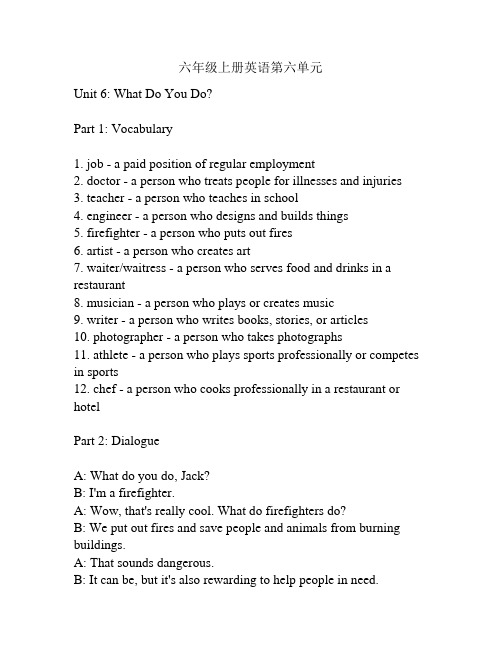
六年级上册英语第六单元Unit 6: What Do You Do?Part 1: Vocabulary1. job - a paid position of regular employment2. doctor - a person who treats people for illnesses and injuries3. teacher - a person who teaches in school4. engineer - a person who designs and builds things5. firefighter - a person who puts out fires6. artist - a person who creates art7. waiter/waitress - a person who serves food and drinks in a restaurant8. musician - a person who plays or creates music9. writer - a person who writes books, stories, or articles10. photographer - a person who takes photographs11. athlete - a person who plays sports professionally or competes in sports12. chef - a person who cooks professionally in a restaurant or hotelPart 2: DialogueA: What do you do, Jack?B: I'm a firefighter.A: Wow, that's really cool. What do firefighters do?B: We put out fires and save people and animals from burning buildings.A: That sounds dangerous.B: It can be, but it's also rewarding to help people in need.A: I see. Do you enjoy your job?B: Yes, I do. It's a challenging but fulfilling career.A: That's great. I'm still deciding what I want to do when I grow up. B: That's okay. There are many different careers to choose from. What do you like to do?A: I like drawing and painting, so maybe I could become an artist. B: That's a great idea. Being an artist can be a lot of fun and very creative.A: Thanks, Jack. It's nice to talk to you.B: You're welcome. Good luck with your future plans.Part 3: GrammarSimple Present TenseThe Simple Present Tense is used to talk about present actions or states. It is formed by adding "-s" or "-es" to the base form of the verb in the third person singular (he, she, or it). For example:- I work at a hospital. (present action)- She teaches math at a school. (present action)- He Engineers large buildings. (present action)- The artist paints beautiful pictures. (present action)- The firefighter saves lives. (present action)- The musician plays the guitar. (present action)- The writer writes books and articles. (present action)Note: The Simple Present Tense is also used to talk about regular or habitual actions, facts, and universal truths.。
七年级上册英语第六单元2b课文
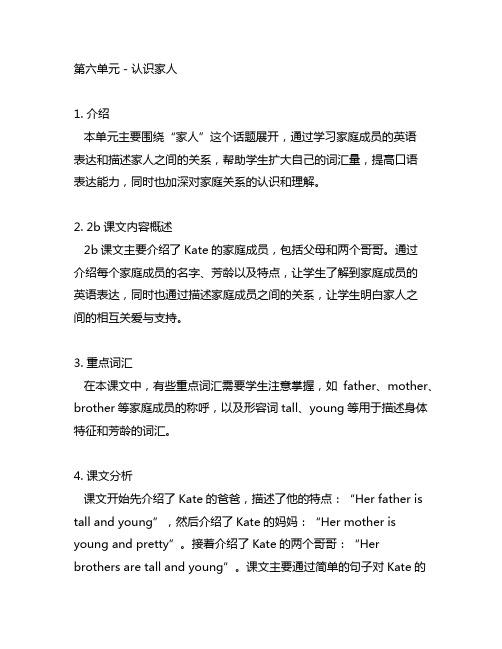
第六单元 - 认识家人1. 介绍本单元主要围绕“家人”这个话题展开,通过学习家庭成员的英语表达和描述家人之间的关系,帮助学生扩大自己的词汇量,提高口语表达能力,同时也加深对家庭关系的认识和理解。
2. 2b课文内容概述2b课文主要介绍了Kate的家庭成员,包括父母和两个哥哥。
通过介绍每个家庭成员的名字、芳龄以及特点,让学生了解到家庭成员的英语表达,同时也通过描述家庭成员之间的关系,让学生明白家人之间的相互关爱与支持。
3. 重点词汇在本课文中,有些重点词汇需要学生注意掌握,如father、mother、brother等家庭成员的称呼,以及形容词tall、young等用于描述身体特征和芳龄的词汇。
4. 课文分析课文开始先介绍了Kate的爸爸,描述了他的特点:“Her father is tall and young”,然后介绍了Kate的妈妈:“Her mother is young and pretty”。
接着介绍了Kate的两个哥哥:“Her brothers are tall and young”。
课文主要通过简单的句子对Kate的家人进行了描述,对于学生来说,这些句子结构简单,词汇较为基础,可以很好地帮助学生理解和掌握。
5. 练习建议在学习这篇课文的时候,教师可以通过朗读、角色扮演等形式让学生熟悉课文内容,然后引导学生进行相关的听力练习和口语练习,加深对家庭成员和描述关系的理解和掌握。
教师也可以设计一些小组讨论或写作练习,让学生在实际运用中巩固所学知识。
6. 阅读拓展在阅读完2b课文之后,可以为学生提供一些相关的阅读材料,如家庭成员的介绍,家人之间的关系描述等内容,让学生通过阅读不同的材料,进一步加深对家庭关系和英语表达的理解。
7. 总结通过学习2b课文,学生不仅可以学习到家庭成员的英语表达,还可以了解到家人之间的关系和描述方式。
通过课文中简单的句子和词汇,能够帮助学生扩大词汇量,提高口语表达能力,是一篇很好的课文。
2021-2022人教版英语六年级上册第六单元知识总结
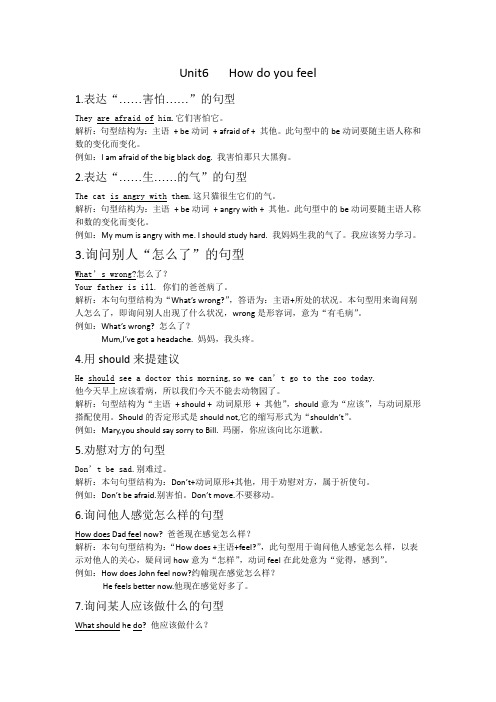
Unit6 How do you feel1.表达“……害怕……”的句型They are afraid of him.它们害怕它。
解析:句型结构为:主语+ be动词+ afraid of + 其他。
此句型中的be动词要随主语人称和数的变化而变化。
例如:I am afraid of the big black dog. 我害怕那只大黑狗。
2.表达“……生……的气”的句型The cat is angry with them.这只猫很生它们的气。
解析:句型结构为:主语+ be动词+ angry with + 其他。
此句型中的be动词要随主语人称和数的变化而变化。
例如:My mum is angry with me. I should study hard. 我妈妈生我的气了。
我应该努力学习。
3.询问别人“怎么了”的句型What’s wrong?怎么了?Your father is ill. 你们的爸爸病了。
解析:本句句型结构为“What’s wrong?”,答语为:主语+所处的状况。
本句型用来询问别人怎么了,即询问别人出现了什么状况,wrong是形容词,意为“有毛病”。
例如:What’s wrong? 怎么了?Mum,I’ve got a headache. 妈妈,我头疼。
4.用should来提建议He should see a doctor this morning,so we can’t go to the zoo today.他今天早上应该看病,所以我们今天不能去动物园了。
解析:句型结构为“主语+ should + 动词原形+ 其他”,should意为“应该”,与动词原形搭配使用。
Should的否定形式是should not,它的缩写形式为“shouldn’t”。
例如:Mary,you should say sorry to Bill. 玛丽,你应该向比尔道歉。
5.劝慰对方的句型Don’t be sad.别难过。
英语五年级上册第六单元教案5篇
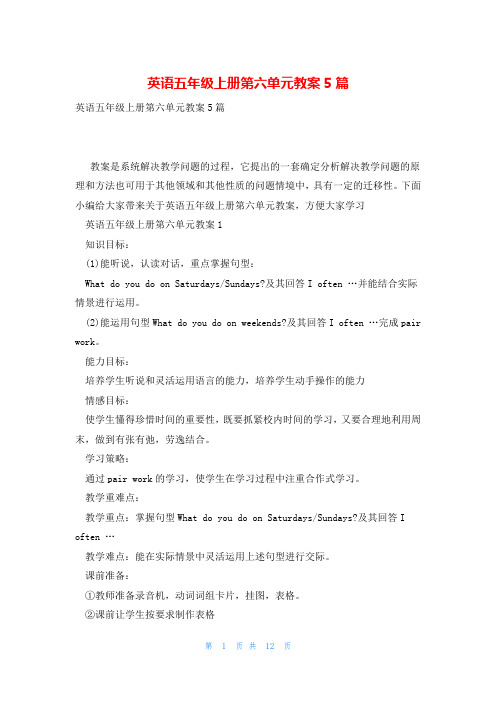
英语五年级上册第六单元教案5篇英语五年级上册第六单元教案5篇教案是系统解决教学问题的过程,它提出的一套确定分析解决教学问题的原理和方法也可用于其他领域和其他性质的问题情境中,具有一定的迁移性。
下面小编给大家带来关于英语五年级上册第六单元教案,方便大家学习英语五年级上册第六单元教案1知识目标:(1)能听说,认读对话,重点掌握句型:What do you do on Saturdays/Sundays?及其回答I often …并能结合实际情景进行运用。
(2)能运用句型What do you do on weekends?及其回答I often …完成pair work。
能力目标:培养学生听说和灵活运用语言的能力,培养学生动手操作的能力情感目标:使学生懂得珍惜时间的重要性,既要抓紧校内时间的学习,又要合理地利用周末,做到有张有弛,劳逸结合。
学习策略:通过pair work的学习,使学生在学习过程中注重合作式学习。
教学重难点:教学重点:掌握句型What do you do on Saturdays/Sundays?及其回答I often …教学难点:能在实际情景中灵活运用上述句型进行交际。
课前准备:①教师准备录音机,动词词组卡片,挂图,表格。
②课前让学生按要求制作表格教学过程:一 warm-up策略一,歌曲,游戏教学法①Sing a song: My Days of the week②Game: Golden eyes教师出示几张已学过的动词词组卡片。
do home work, read books, playcomp uter games, play football, watch TV …让学生快速地看了一遍,要求学生说出所看到的动词词组,谁说得又多又快就为胜者。
(策略分析;利用歌曲,游戏活跃课堂气氛,使学生的注意力回到课堂,学生情趣大开。
)策略二;语言交际法③GreetingT: What day is it today?S: It’s Monday.T: What do you have on Mondays?S: I have …T: What do you do on Saturdays/Sundays?S: I often …(分析;师生自由交流,增深师生情感,又为以下的教学内容作好知识的辅垫。
英语五年级上册第六单元

英语五年级上册第六单元一、单词。
1. forest(森林)- 例句:There are many animals in the forest.(森林里有许多动物。
)2. river(河流)- 例句:The river is very long.(这条河流很长。
)3. lake(湖泊)- 例句:We can go boating on the lake.(我们可以在湖泊上划船。
)4. mountain(高山)- 例句:The mountain is very high.(这座山很高。
)5. hill(小山)- 例句:There is a small house on the hill.(小山上有一座小房子。
)6. tree(树)- 例句:The tree is very big.(这棵树很大。
)7. bridge(桥)- 例句:There is a beautiful bridge over the river.(河上有一座美丽的桥。
)8. building(建筑物;大楼)- 例句:There are many tall buildings in the city.(城市里有许多高楼大厦。
)9. village(村庄)- 例句:My grandparents live in a small village.(我的祖父母住在一个小村庄里。
)10. house(房子)- 例句:Our house is near the park.(我们的房子在公园附近。
)二、句型。
1. Is there a …?(有……吗?)- 肯定回答:Yes, there is.(是的,有。
)- 否定回答:No, there isn't.(不,没有。
)- 例句:Is there a river in the park?(公园里有河流吗?)Yes, there is.(是的,有。
)2. Are there any …?(有一些……吗?)- 肯定回答:Yes, there are.(是的,有。
第六单元英语单词
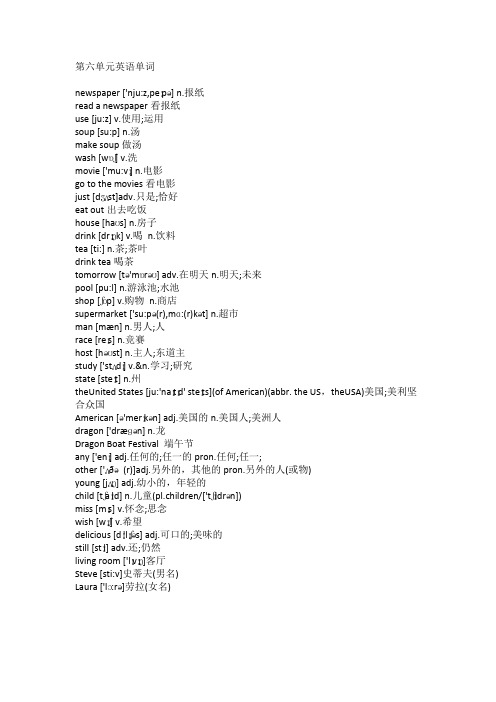
第六单元英语单词newspaper ['nju:z,peɪpə] n.报纸read a newspaper看报纸use [ju:z] v.使用;运用soup [su:p] n.汤make soup做汤wash [wɒʃ] v.洗movie ['mu:vɪ] n.电影go to the movies看电影just [dʒʌst]adv.只是;恰好eat out出去吃饭house [haʊs] n.房子drink [drɪŋk] v.喝n.饮料tea [ti:] n.茶;茶叶drink tea喝茶tomorrow [tə'mɒrəʊ] adv.在明天n.明天;未来pool [pu:l] n.游泳池;水池shop [ʃɒp] v.购物n.商店supermarket ['su:pə(r),mɑ:(r)kət] n.超市man [mæn] n.男人;人race [reɪs] n.竞赛host [həʊst] n.主人;东道主study ['stʌdɪ] v.&n.学习;研究state [steɪt] n.州theUnited States [ju:'naɪtɪd' steɪts](of American)(abbr. the US,theUSA)美国;美利坚合众国American [ə'merɪkən] adj.美国的n.美国人;美洲人dragon ['dræɡən] n.龙Dragon Boat Festival 端午节any ['enɪ] adj.任何的;任一的pron.任何;任一;other ['ʌðə(r)]adj.另外的,其他的pron.另外的人(或物)young [jʌŋ] adj.幼小的,年轻的child [tʃaɪld] n.儿童(pl.children/['tʃɪldrən])miss [mɪs] v.怀念;思念wish [wɪʃ] v.希望delicious [dɪ'lɪʃəs] adj.可口的;美味的still [stɪl] adv.还;仍然living room ['lɪvɪŋ]客厅Steve [sti:v]史蒂夫(男名)Laura ['lɔ:rə]劳拉(女名)。
英语八年级上册第六单元笔记
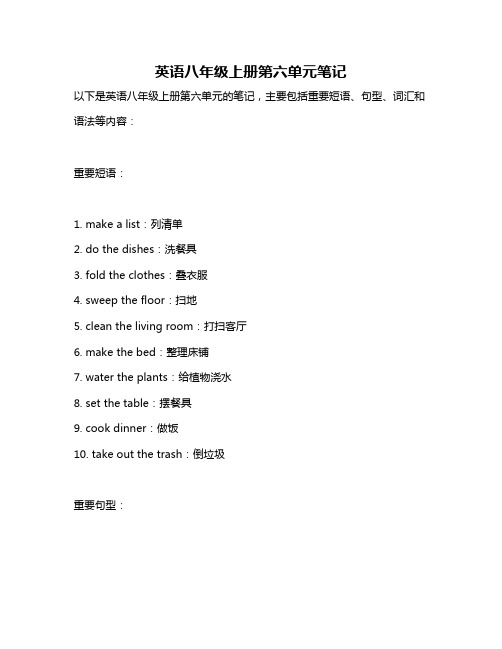
英语八年级上册第六单元笔记以下是英语八年级上册第六单元的笔记,主要包括重要短语、句型、词汇和语法等内容:重要短语:1. make a list:列清单2. do the dishes:洗餐具3. fold the clothes:叠衣服4. sweep the floor:扫地5. clean the living room:打扫客厅6. make the bed:整理床铺7. water the plants:给植物浇水8. set the table:摆餐具9. cook dinner:做饭10. take out the trash:倒垃圾重要句型:1. What can you do to help around the house?:你能做些什么来帮忙做家务?2. I can sweep the floor.:我会扫地。
3. Can you make the bed?:你会整理床铺吗?4. Can you cook the meals?:你会做饭吗?5. Can you set the table?:你会摆餐具吗?6. Can you water the plants?:你会给植物浇水吗?7. Can you take out the trash?:你会倒垃圾吗?8. Do you often do chores at home?:你经常在家做家务吗?9. How often do you clean your room?:你多久打扫一次房间?10. I make my bed every day.:我每天都会整理床铺。
11. My mom does the dishes every day.:我妈妈每天都会洗餐具。
12. We often clean the living room on weekends.:我们经常在周末打扫客厅。
13. I help my dad water the plants.:我帮我爸爸给植物浇水。
四年级上册英语第71页第六单元单词

第一、介绍单元主题本单元是四年级上册英语第六单元,主要学习一些日常生活中常见的单词和短语。
通过本单元的学习,学生将会对这些词汇有更深入的理解,有助于他们在日常交流中更流利地运用这些单词和短语。
第二、单词和短语列表1. breakfast 早餐2. lunch 午餐3. dinner 晚餐4. milk 牛奶5. juice 果汁6. bread 面包7. rice 米饭8. noodles 面条9. soup 汤10. chicken 鸡肉第三、学习重点和难点1. 学习重点:掌握以上单词的发音和意思,能够灵活运用这些词汇进行日常交流。
2. 学习难点:对于一些抽象意义的单词,如 breakfast, lunch, dinner 等,学生可能需要通过图片、实际操作等方式来加深理解。
第四、教学方法和内容安排本单元的教学可以结合图片展示、实物展示和情景模拟等多种方式。
教师可以使用图片或实物展示不同种类的食物,引导学生学习并模仿发音和使用这些单词。
还可以通过角色扮演的方式,让学生在语境中学习和使用这些词汇,加深印象。
第五、教学目标1. 知识目标:能够听、说、读、写以上单词和短语。
2. 能力目标:能够在日常生活中正确地使用这些单词和短语,进行简单的交流。
3. 情感目标:培养学生的英语学习兴趣,激发学生对英语学习的热情,使学生在轻松愉快的氛围中增强语言能力。
第六、教学重点和难点1. 教学重点:引导学生掌握以上单词的发音和意义,并能够初步进行运用。
2. 教学难点:对于一些含义抽象或与学诞辰常生活经验较为脱离的单词,如 dinner, lunch 等,需要通过多种方式加深学生的理解和记忆。
第七、教学过程安排1. 第一课时:通过图片展示和听音辨词的方式,让学生初步了解以上单词的发音和意思。
2. 第二课时:通过角色扮演和实物展示的方式,引导学生在语境中模仿和运用这些单词,加深印象。
3. 第三课时:通过游戏、歌曲或课堂互动等形式,巩固学生对以上单词的记忆,并进行小组或个人表演,激发学生的学习兴趣。
英语八年级上册第六单元知识点
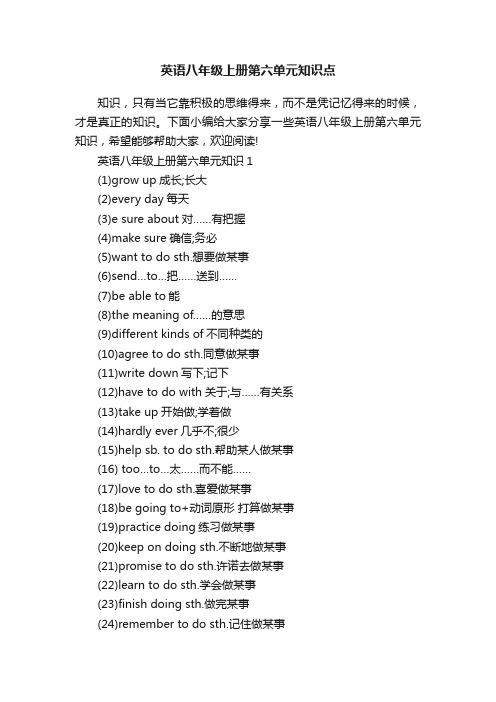
英语八年级上册第六单元知识点知识,只有当它靠积极的思维得来,而不是凭记忆得来的时候,才是真正的知识。
下面小编给大家分享一些英语八年级上册第六单元知识,希望能够帮助大家,欢迎阅读!英语八年级上册第六单元知识1(1)grow up成长;长大(2)every day每天(3)e sure about对……有把握(4)make sure确信;务必(5)want to do sth.想要做某事(6)send…to…把……送到……(7)be able to能(8)the meaning of……的意思(9)different kinds of不同种类的(10)agree to do sth.同意做某事(11)write down写下;记下(12)have to do with关于;与……有关系(13)take up开始做;学着做(14)hardly ever几乎不;很少(15)help sb. to do sth.帮助某人做某事(16) too…to…太……而不能……(17)love to do sth.喜爱做某事(18)be going to+动词原形打算做某事(19)practice doing练习做某事(20)keep on doing sth.不断地做某事(21)promise to do sth.许诺去做某事(22)learn to do sth.学会做某事(23)finish doing sth.做完某事(24)remember to do sth.记住做某事英语八年级上册第六单元知识21be going to的用法1)be going to+动词原形——表示将来的打算、计划或安排。
常与表示将来的tomorrow, next year in+时间段等时间状语连用,be随主语有am, is, are 的变换肯定句:主语 + be going to + 动词原形 + 其他。
否定句:主语 + be not going to + 动词原形 + 其他.一般疑问句Be + 主语 + going to + 动词原形 + 其他肯定回答:Yes, 主语 + be.否定回答:No, 主语 + be not.特殊疑问句:疑问词 + be + 主语 + going to + 动词原形 + 其他?2) 如果表示计划去某地,可直接用 be going to + 地点We are going to Beijing for a holiday.3) 表示位置移动的动词,如go , come, leave 等常用进行时表示将来。
- 1、下载文档前请自行甄别文档内容的完整性,平台不提供额外的编辑、内容补充、找答案等附加服务。
- 2、"仅部分预览"的文档,不可在线预览部分如存在完整性等问题,可反馈申请退款(可完整预览的文档不适用该条件!)。
- 3、如文档侵犯您的权益,请联系客服反馈,我们会尽快为您处理(人工客服工作时间:9:00-18:30)。
Corporate entertaining in Japan
Hisako Saka, a hostess at a bar called Bouquet in Tokyo’s high-class Entertainment area, is complaining. ‘Customers go home before the last train and order far fewer drinks. They are less cheerful and talk about restructuring all the time,’ she said. ‘Fewer girls are deciding to become hostesses. My salary has halved.’ Corporate entertaining is in steep decline. Newly released figures from Japan’s National Taxation Administration have revealed that Japanese companies spent 13.3percent less on entertaining and gifts in the year to last January than in the previous year. The latest figures show spending on entertainment is at its second lowest level since records began in 1961. the decline indicates that the high spending days of the 1983s are over and that a new phenomenoncost control-has entered the corporate dictionary. As the credit environment has tightened, losses have multiplied, restructuring has taken hold and the concept of shareholder value has crossed the Pacific, leading to entertainment budgets being cut. In the boom days some executives would think little of running up a £7,000bill in one night entertaining an important client.
D Match the option in the first box with the drinks in the
second box. For example, black or white coffee. Add other drinks. Options 1 black/white 3 red/ white 5 bottled/draught 2 still/sparkling 4 single/double 6 with milk/lemon Drinks a) beer c) water e) coffee b) Wine d) tea f) whisky
A
6.1 Listen to the first part of the interview with
6.2 Listen to the second part of the interview and answer these questions. 1 Why is corporate entertaining important for small businesses? 2 What does Tony think about entertaining in times of economic decline?
Vocabulary
D Work in pairs. Imagine you are offering a guest a drink. Use words from Exercise D.
Reading
A
How important is corporate entertaining in your: a) country b) industry/organisation? B Skin the article below. Then decide which of these headlines is the best. 1 JAPAN SAYS GOODBYE TO KARAOKE NIGHES 2 JAPAN PREFERS TO SING AS BUDGETS ARE CUT 3 JAPANESE GOOVERNMENT TO TAX GIFTS AND ENTERTAINMENT
It’s quite spicy/rich you can eat it with rice/pasta
It’s a kind of seafood/vegetable It’s a bit like chicken/lamb
boiled fried baked grilled roast steamed spicy hot rich sweet salty delicious tasty bland rare medium rare well done
Reading
Reading
These days the entertainment still goes on but at more modest establishments. Cheaper restaurants are busier and karaoke parlours are being chosen over expensive nightclubs Kunio Sato, a bar owner for the past 35 years in Ginza, Tokyo’s most famous entertainment area, said sadly, ‘Companies are much stricter these days with what they will let their employees spend compared with the old days.’ The cost cutting does not end at the bar. Some of Japan’s huge conglomerates have cut down ritual corporate gift giving. Budgets for gifts at New Year have, in some cases, been cancelled, forcing employees to buy the gifts themselves, according to an employee at one large conglomerate. From the outside, the discovery by Japanese companies of basic cost control can be seen as an encouraging development in an economy that had previously let spending run wild.
1 What kind of entertainment programme do most companies have? 2 According to Tony, why do companies spend money on corporate entertaining? 3 What other events are mentioned in addition to the ‘big six’?
entertaining to the photographs above.
1 The Grand Prix 3 The Open Golf Championship 5 Royal Ascot 2 Wimbledon 4 The Chelsea Flower Show 6 Henley Regatta
C Many companies spend a lot of money on corporate
entertaining. Do you think the money is well spent? Why or why not?
Listening
Tony Barnard, an expert on corporate entertaining. Then answer these questions.
opera/concerts wine tasting horse racing motor racing golf football tennis restaurant art galleries
historic site bar/nightclub theatre
B Match the six most popular UK events for corporate
B
Listening
C What big events do companies use to
entertain customers in your country?
Vocabulary
A Put the following into a logical order for entertaining in a restaurant. a) Look at the menu e) Have the main course b) Ask for the bill(BrE)/check(AmE) f) Have a dessert c) Book a table (BrE) g) Order a starter Make a reservation h) Have an aperitif d) Leave a tip
